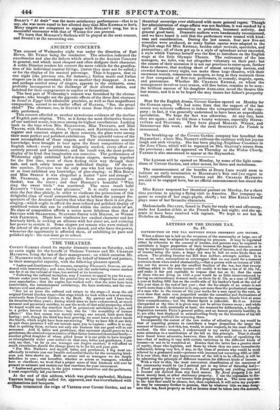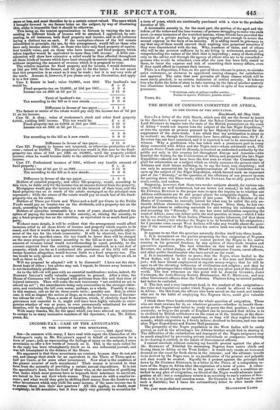LETTERS ON THE INCOME TAX. No. IV.
DISTRIBUTION OF THE TAN BETWEEN FINED PROPERTY AND INCOME.
When a direct tax is laid on the resources of the community at large, one of two methods may be adopted for equalizing its pressure. It may be regulated either by reference to the amount of income, and persons may be required to contribute a larger proportion of their incomes the larger the amount ; or it may be regulated by reference to the different hinds of income, and the amount of income being the same, a larger tax may be laid on some kinds than on. others. The pending Income-tax Bill does neither, attempts neither. It is framed on some assumptions so extravagant that no one could for a moment maintain them when stated abstractedly,—that a person with an income of 150/. has not the means to pay the smallest fraction of the tax, but that twenty shillings added to this same income will enable it to bear a tax of 4/. 10s. 7d., and make it fair and equitable to impose that tax on it; that the mass of those who are living on 150/. a year would be as little inconvenienced by having an extraordinary demand made on them for 4/. 10s. as a man of 10,000/. a year at finding 300/. less on the credit-side of his banker's book at the end of this year than at the end of last year ; that the fee-simple of an estate is not worth more than a life-interest in it, nay, not more than the professional earnings of a man who in the course of the year works for a sum equal to the rent, or even than that same sum jeopardied amidst the casualties and fluctuations of commerce. Rivals and opponents denounce the measure, friends hint at some little reconsideration ; but the Master Spirit is inflexible. Be it so. Advice disregarded at the time it is given may not be advice thrown away ; and while the present is still, nominally at least, the moment for deliberation, a friendly disposition towards PEEL'S general policy, and an honest patriotic hostility to it, are alike best displayed in animadverting freely on the blemishes of his bill and suggesting methods for removing them. Incomparably the easiest of the two modes of adjusting the tax would be that of requiring persons to contribute a larger proportion the larger the amount of income; and this, too, mould, in some respects, be the most effectual method. On this account, I endeavoured in my earlier letters to awaken some attention to a modification of the bill on this principle. That it should have found fewer advocates, however, than the other mode of equalizing the tax—that of making it vary with certain variations in the different kinds of income—is not to he wondered at. Besides that the latter has a greater show of equity, those who legislate, and those by whom they are more immediately influenced, belong very few, if any, to the class of persons who would be most relieved by a graduated scale—persons with incomes not exceeding 400/. or 500/. It is now clear, that if any improvement of the bill is to be effected, it will be by admitting the principle of different taxation for different kinds of income. With a view to this, the most convenient classification of the resources of the community would be (as I pointed out in my letter of Saturday last)— 1. Fixed property yielding income ; 2. Fixed property not yielding income; 3. Income not derived from any fixed source. By fixed property I do not mean merely land, or other stationary property. I use the expression to dis- tinguish property that is not income from property that is. The term may not be the best that could be chosen, but, thus explained, it will serve my purpose. It may be necessary further to premise, that by whatever title we may desig- nate this tax, fixed property as well as income mast be taken into the account,
more or less, and must therefore be to a certain extent valued. The cases which I brought forward in my former letter on the subject, by way of illustrating this, make it-impossible that it should be otherwise. This being so, the nearest approximation to fairness in varying the tax ac- cording to different kinds of income will be attained, I apprehend, by esti- mating, in all instances, both fixed property and income, and in all instances laying a distinct tax on each. If the exemption-clause of the bill remain unmodified in principle, the tax, by this arrangement, would fall on those who have only income above 150/., on those who have only fixed property of equiva- lent taxable value, and on those who have income and fixed property which taken together would be equivalent to more than 150/. income. A little con- sideration will show how extensive a relief would be thus afforded throughout all those kinds of income which have least strength to sustain taxation, and this without impairing the amount of revenue which it is proposed to raise.
The relative taxation for fixed property and for income, I would determine at 10d. per 100/. for the former, and 3d. per 1/. for the latter. I do not assert that this proportion is as exact as it may be made ; but it is not very wide of the mark. Assume it, however, if you please only as an illustration, and apply it in a few cases.
Case L Estate in land ; value 10,0001., rent 300/. The landlord's tax would be, s. d.
Fixed-property-tax on 10,0001., at 10d. per 100/ 4 3 4 Income-tax on 300/. at 3d. per 1/. 3 15 0 Total of landlord's tax 7 18 4 Tax according to the bill as it now stands 9 0 0 Difference in favour of tax-payer 1 1 8 The farmer or renter of the estate would pay only the income-tax of 3d. per 1/. on his income.
Case II. A shop ; value of tradesman's stock and other fixed property 6,0001., yielding 300/. income. This tax would be. £ s. d. Fixed-property-tax on 6,000/. at 10d. per 100/. 2 10 0 Income-tax on 300/. at 3d. per 1/ 3 15 0 6 5 0 Tax according to the bill as it now stands 9 0 0 Difference in favour of tax-payer 2 15 0 Case III. Property in houses not tenanted, or otherwise productive of in- come; valued at 10,000/. The proprietor's tax would in this case be the fixed- property-tax alone of 10d. per 100/. on 10,0001., until the property yielded income, when he would become liable to the additional tax of 3d. per 1/. on the income.
Case IV. Professional incomes of 3001., without any taxable amount of fixed property ; £ s. d.
Income-tax of 3d. per IL 00 3001 3 15 0 Tax according to the bill as it now stands 9 0 0 Difference in favour of the tax-payer 5 5 0 Holders of entailed property, and other life-property, would, according to this view, be liable only for the income-tax on income derived from the property.
Mortgagees would pay the income-tax on the interest of their loan, and the 6xed-property-tax on so much of the estate mortgaged as the principal sum represents ; while the owner of the estate would pay so much less of the fixed- property-tax on his estate. Holders of Three per Cents and Three-and-a-half per Cents in the Public Funds would pay an income-tax on the dividends, and a property-tax on the stock, according to its saleable value. Holders of annuities terminable by a term of years, should be allowed the option of paying the income-tax on the annuity, or, valuing the annuity, to pay a fixed-property-tax on the valuation, as equivalent to so much fixed pro- perty. Without more details, it will be evident that the arrangement would afford immense relief to all those kinds of income and property which require to be eased, and that it would be an approximation, at least, to an equitable adjust- ment of the tax for the whole community. It will be observed, too, that in every one of the specified cases, the tax would be lower than will be charged en the same property or income according to the bill as it now is. The total amount of revenue raised would notwithstanding be equal, probably, to the amount expected from the existing arrangement, inasmuch as a vast deal of property, which (so far as I understand the provisions of the bill) will now escape taxation altogether, would become liable to a fixed property-tax. The tut would be only spread over a wider surface, and thus be lighter on all, as well as fairer to all.
Will my proposal be adopted? will it be discussed? I have not the slen- derest hope of either ; hut advice may not, I repeat, be thrown away because it is not immediately profitable. As to the bill—it will pass with no essential modification; unless, indeed, Sir ROBERT INGLIS'S really valuable suggestion be pressed. After a time, the House of Commons will be besieged with petitions from this and that class of injured interests. Then will come the now customary "act entitled an act to amend an act "; the amendments being only concessions to the stronger claim- ants, and rendering the bill even worse, perhaps, as a whole. Possibly it may, in this manner, rub on for its three-years term ; possibly not. But, in either case, it will so disgust the nation at large, as to make the very name of Income- tax odious for ever. Thus, a mode of taxation, which, if carefully freed from grievances not essential to it, might still have been highly valuable in emer- gencies whether of war or peace, or even permanently substituted for other taxation, will be damaged, perhaps irreparably, for future use.
With many thanks, Sir, for the space which you have allowed my strictures to occupy in so many successive numbers of the Spectator, I am, Mr. Editor,



























 Previous page
Previous page